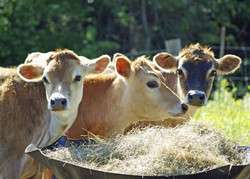The IPAFEED database – a key deliverable of the EU-funded MARLON project – contains searchable data for monitoring possible impacts of genetically modified (GM) crops on the health of livestock animals. Through providing guidance and the means to closely monitor GM feed-related risks in livestock, the project seeks to help regulators and the food supply chain ensure that any such health risks can be identified early and effectively.
Food safety has become a critical issue for both industry and policy makers. High profile food scares over the last few decades – from the outbreak of 'Mad Cow Disease' in the 1990s to the horsemeat in beef products scandal a couple of years ago – have shaken consumer confidence in the safety of food products.
This has cost businesses billions in lost earnings and prompted calls for ever tighter traceability and more transparent labelling of products. A few anecdotal accounts on possible impacts of GM crop consumption on domestic animals have appeared in the media, but have not been confirmed.
In order to ensure transparency, the MARLON project focused on bringing knowledge on GM crops in animal feed together in one place. In setting up the IPAFEED database, data was extracted from scientific papers with detailed descriptions of each study, accessible results and links to sources. This database was continuously updated throughout the duration of the three-year project, which was completed in July 2015.
In addition, 11 project partners from eight countries carried out surveys in their respective nations. Researchers also collated information on, for example, measurable animal health indicators and how best to analyse exposure. Tools and guidelines to help monitor the long-term health of animals exposed to feed derived from GM crops have also been developed.
The positive news for both regulators and European agriculture is that data collected from controlled short-term, long-term and multi-generational feeding trials have generally pointed to no adverse health effects on animals fed GM ingredients. Some effects may even be positive: several reports indicate, for example, that insect-resistant GM crops may contain lower levels of toxic chemicals produced by fungi that can colonise insect-damaged crops.
GM crops grown outside of Europe are often destined for several EU markets where they may be processed into animal feed. The EU approves of using GM-derived ingredients if each crop passes vigorous safety assessments, and regulators may still require post-market monitoring as a means of verifying pre-market assumptions.
While this requirement has not yet been imposed on GM animal feed, the MARLON consortium determined that European agriculture should stay ahead of the curve by having the means to closely monitor the GM content of feed at their fingertips. This will also ensure that regulators will have the necessary tools at hand should post-market monitoring become a legal requirement.
More information: For further information, please visit the MARLON project website: marlon-project.eu/
Provided by CORDIS























